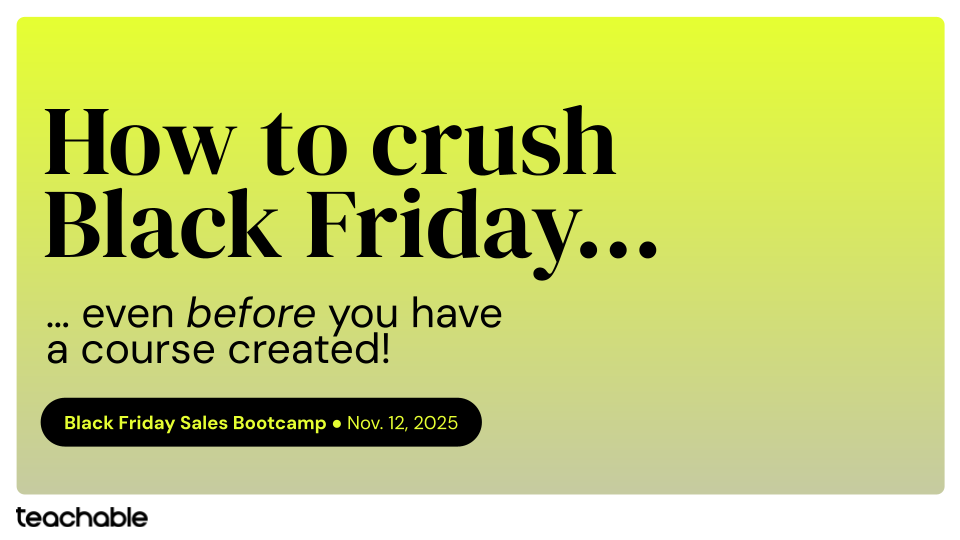Quora is one of the most valuable social media sites that definitely doesn’t get enough credit. If you’re wondering what Quora is or how you can possibly use it to drive traffic and direct potential customers in your target audience to your course, you’ve come to the right spot. We’re diving deep into Quora marketing so you can utilize this underrepresented platform like a pro.
What is Quora
Quora is a site that allows its users to ask and answer questions. These questions can range from hypotheticals, specific business or industry specific, or story or expert requests. It’s a lot like Reddit in the sense that you’ve got an upvoting system and the higher ranked your answer, the more people will see it. This also lends itself to natural brand awareness by demonstrating your expertise to Quora users.
What’s more, it’s likely there’s a subset of your audience you never imagined who is hanging out on Quora. Once you’ve started answering questions, your Quora profile will look a little something like this:

Once you click any of the questions you’ve already answered or a new question that you intend to answer, the anatomy of a Quora post looks a little something like this:
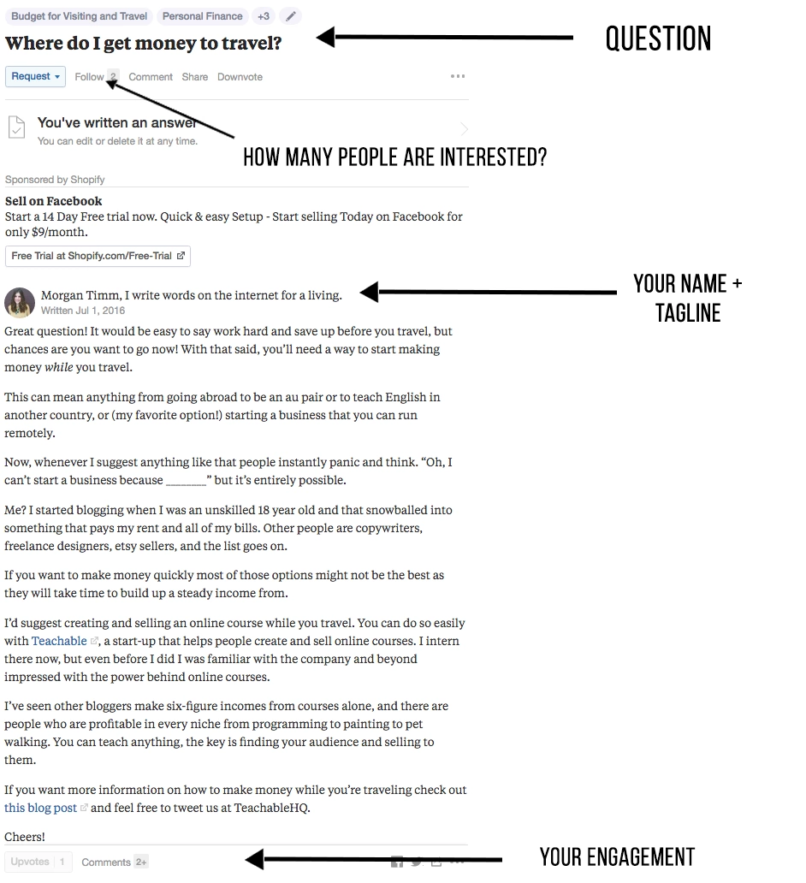
Again, like Reddit, communities form on Quora and have their regular users who have asked and answered thousands of questions. These people are going to have a bit more clout than a user who hops on once or twice a month to self promo. With that said, you don’t have to spend every waking minute answering questions to develop a Quora marketing strategy.
How to get traffic from Quora
There’s really no wrong or right way to use Quora especially as a digital marketing tool. In fact, there are very few best practices and guildelines. As mentioned, you’ll find questions ranging from entertaining to serious to everything in between. When you first log on to the website, it’ll look a little something like this:
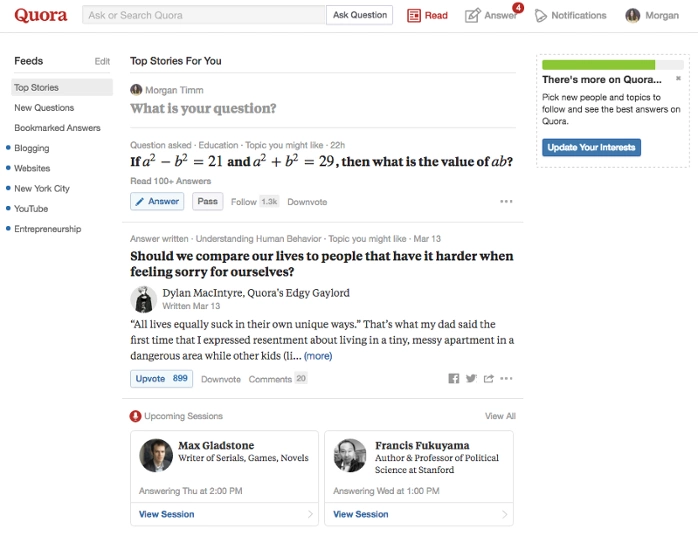
The questions you see in your main feed will either be relevant to either the interests you follow or previous questions that you’ve looked at. They can also show the most popular questions on the site at the time.
Answering questions like this more often than not will result in your answer being buried. However, every now and then you’ll strike gold and answering a popular question will gain some traction.
If you only want to see questions under a specific topic, you can click the options that you pre-selected during sign up on the sidebar. This will give you a selection of questions that range from very new to very popular. Answering questions here gives you a better chance of gaining followers, upvotes, and views. This will only help you in sharing the most relevant and helpful content on Quora.
Answering questions
Naturally, part of why you’re using Quora is to link back to your site or course. But, including links back or answering questions about your product specifically are necessarily going to result in success.
Answers should provide valuable and well thought out ideas before immediately dropping in a link. People want you to prove you can provide value before the click a link or upvote your answer as a good answer.
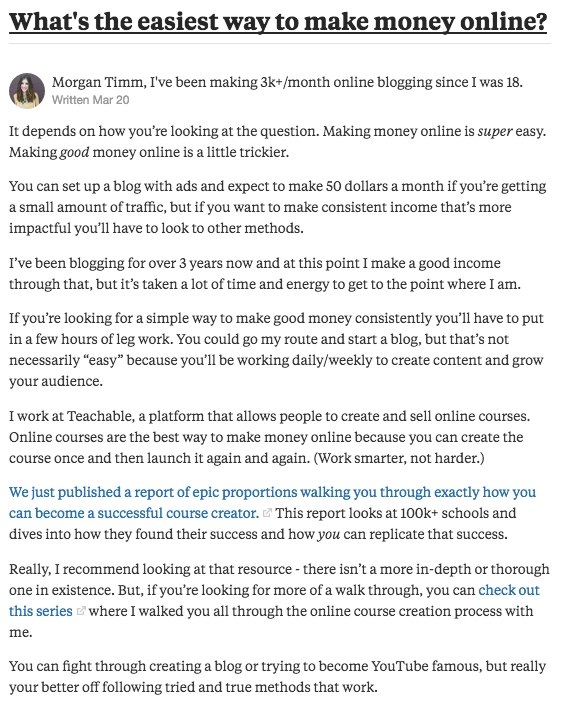
One strategy may be to provide “breadcrumbs” that tempt Quora users to click the link rather than telling people to click the link. In this case, telling them a solution to make money online in addition to also letting them know the most effective ways. Then following up with a blog resource.
How to market on Quora to get views
So you can have a perfectly fine answer on a question in Quora. In fact, it’s the most well thought out answer on the entire question, yet it’s not the most upvoted answer. It might be a bummer to see, but there are a few things that you can do to help your answer gain the momentum that it deserves.
- Add an image to your answer. If you can back up your answer with a chart or a graph or image, you’re going to do a better job capturing attention.
- Use sources. Quora’s linking allows you to add links as footnotes so you can easily source your information in an organized way. There are a lot of people on Quora who go all out writing what could pass as novels for the answers, but without sources, their answers won’t look as thorough as yours.
- Provide long and well-sourced answers. If you do, you’ll definitely be a contender for the highest slot on the answers page. And you’ll develop some brand and user awareness.
- Become a thought leader in a specific subject. If people are consistently seeing you post valuable answers in a topic they follow, they’re going to be more likely to start engaging with you and following along your posts.
Becoming a thought leader
This is a vague recommendation, but we’ll walk you through what it takes to be seen as a thought leader and authority in the niche you choose.
First off: choose a niche. This should be related to your business as a whole. So if your business is digital marketing, you probably don’t want to become a thought leader in the gardening section no matter how great your orchids are looking.
Once you’ve identified the niche you want to become a thought leader in, you’re going to need to devote some time answering questions and engaging with others.
Copy and paste all of your answers into a Google Doc. Chances are you’ll be seeing a lot of versions of the same questions. Now, you don’t want to copy and paste them directly, but consider reworking a few of your old answers. It gets the job done and is just as thorough, but it’s going to save you a lot of time.
Keep in mind: Each and every question you answer might be the first someone ever sees of you so you should put a good amount of thought and effort into everything you answer in your target niche. Once people see you as a thought leader, something cool will start to happen and you’ll get notifications that people are asking you to answer specific questions. That looks something like this:

When you’ve been requested to answer a question, you’ll be able to check a box that says “Answer Requested Attribution” that basically serves to say, “I’m an expert on this topic.” This is great social proof that is going to go a long way in helping others see you as an authority. Additionally, you’ll begin to see who the current authorities are in the niches you’re frequenting. Don’t get discouraged if those have more followers than you. Consistency will go a long way here. Plus, people are following you because they want to read your specific point of view.
Getting featured
Now, sometimes you’ll find something really incredible happens and Quora features one of your answers in their newsletters.

This can result in a spike in traffic:
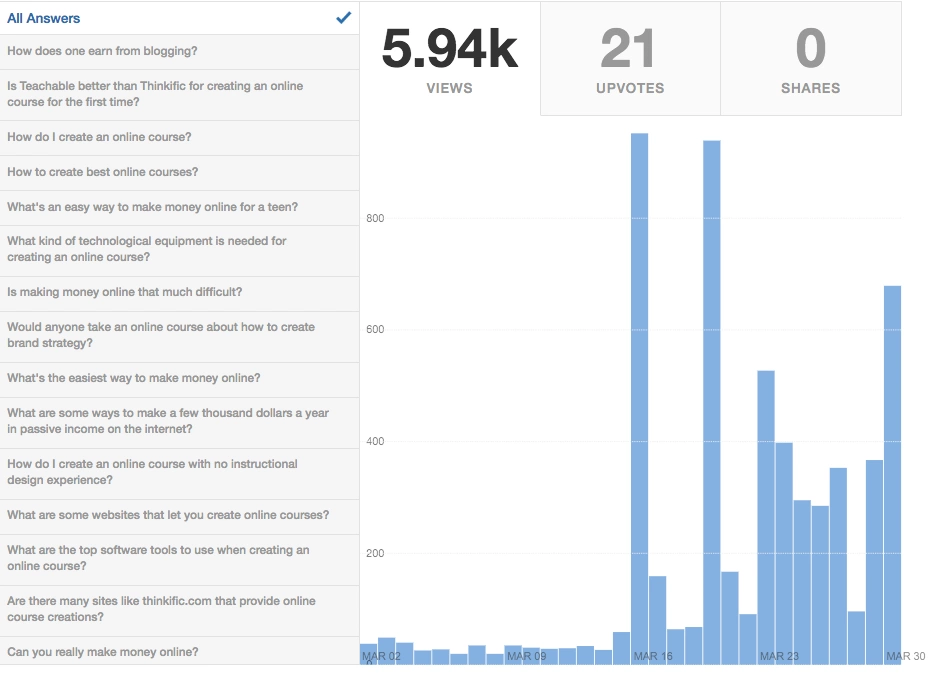
Now, this may not translate into a ton of upvotes or followers. However, it can give that question and your account exposure, no matter how short-lived.
Growing your Quora account
The more followers you have, the more people who are going to see your new answers, and the more impactful your time on Quora will be. Quora may be the social media platform that’s slower to grow, but here are a few tricks to try:
- Connect to Facebook. You may find some of your social network begins to follow you. They aren’t necessarily in your target audience, but because there’s that personal connection, they’re more likely to upvote your answers when they see them.
- Be active in one community. If you’re answering questions in a dozen different niches, people will see your account and not know what to expect. If you have positioned yourself in one niche, people in that niche will want to follow you.
- Engage with other people. Follow people you’re interested in, upvote their answers, and leave comments. Quora is unlike most other social media sites, but the one thing that remains the same is that you should be social.
- Be active in general. It’s easy to just want to answer a few questions once a week when you publish new content, but you’ll see slow growth that way. Go through niches you’re interested in and answer questions just for fun every now and then. Promote old content or promote nothing at all, just be active and get your account out there.
Quora blogs
You actually have the capability to create a blog on Quora where your followers can keep up to date with you, and you can further establish yourself as an authority. Now, if you are using Quora strategically, then you should only write about topics within your niche as to not dilute your authority.
Why create a Quora blog?
The main reason to blog on Quora is because it eliminates the legwork of finding an engaged audience for your own blog. Your audience is already on Quora, and through a simple search, they will be able to find your blog if you’re writing about things that interest them.
If you already have a blog audience, it’s as simple as copying and pasting a few paragraphs of your latest blog posts over to your Quora blog and adding a “read more” link directing people to the full blog post at the bottom. Now you’re going to be funneling traffic to your website so you can hopefully then funnel them to your paid products.
It’s also great for SEO purposes because Quora already has plenty of Google search authority. Keep an eye out when you’re looking to Google for answers: You’ll find that there will be links to Quora properties on the first few pages more often than not.
How often should you post?
Like any blog you’re running, consistency is going to go a long way. If you can update your Quora blog once a week you can start to amass a consistent following who knows to check back for new content weekly. When it comes to conversations on posting consistency, the classic “quality vs. quantity” debate tends to break out. But don’t sacrifice either. When you’re trying to grow a business it’s important to treat it like a job and make time for the things that are going to help you grow.
{{entrepreneur-component="/blog-shortcodes/blog-popup"}}
Making money on Quora
So how does that translate into you making money? If you haven’t created an online course yet, you can refer to this blog post to walk you through the process. For the purposes of the rest of this post, though, we’ll assume that you’ve created your product and you’re ready to sell. Your product should be something that’s appealing to the same niche that you built your online course around. The more focused the niche, the better.
From here, you have two options: You can direct traffic straight to the sales page, or you can direct traffic to a free resource where you then upsell to your paid product.
If you’re looking for a higher conversion rate, we suggest the latter. With that said, you’ll be playing the long game and if you don’t already have a free resource, you’ll need to create one.
Going from a free resource to an upsell is going to convert better because that gives people more time to grow to trust you and your brand. It’s going to be a hard sell to get people to part with their cash straight from a Quora question, but it’s a lot easier to get them to sign up for a free email course or ebook.
This is why it’s so important to be providing value when you’re directing people to your resources. It’s going to be tempting to answer as many questions as possible and drop links to your sales page or resource so you get a ton of eyes on your link, but that will serve to backfire if you get banned or nobody gives you upvotes.
Promoting a course launch with your Quora blog
When it comes to promoting your launches, there are a few ways to go about it. One of our favorite ways has always been through email lists and blogs. While usually we recommend promoting your launch on your own blog, you can double up and promote on your blog and on your Quora blog.
To promote on any blog, you’ll have two phases: education and selling.
During the education phase, your goal is to make your audience want your product before they even know that you have a product. This means simply pique their interest. Make them want to know more about your course topic through engaging and valuable blog posts.
Once you’ve got them hooked and wanting to know more, you’ll present the course they didn’t even know they wanted and get them excited to buy. Depending on your niche and your audience size, these phases might slightly vary, but at the end of the day you’ll have luck going off of this general outline:
Post 1: 10 things you should know about ___________.
This post is going to get your course topic on their radar. If your course is on vegetable gardening, here is where you’re going to offer some fun facts and tips for your audience. Dig deep and offer unique content.
Post 2: How to save money growing your own vegetable garden
This post is incredibly aligned with your online course. You want to give them a taste of what you have to offer.
Post 3: The ultimate guide to vegetable gardening
Here is where you launch your course. Write this super valuable blog post, and basically give the first module of your course away here. At the end you can say, “If you want the final five steps, you can check out my online course here.”
Post 4: The top five resources for gardeners
Here you’re going to position your online course as the most valuable resource for new gardeners. Use benefit driven language and let the audience know exactly what they’ll get from taking it. The other four resources should not directly compete with you.
Things to keep in mind
There are some best practices when it comes to using Quora to promote your brand and business. One thing to keep in mind is that banning is possible on Quora.
For example, it’s possible for a stranger to go in and upvote all of your answers, which can trigger suspicion and lead to a ban Situations like that are unavoidable, but knowing how strict Quora can be, there are ways you can help yourself.
- Don’t be spammy. Just as we mentioned above, value is more important thank self promotion.
- Don’t create upvote groups. People will come together and drop links whenever they post in agreement that everyone in the group will upvote everyone’s answers. This works great for a week, but then chances are all of the accounts will be shut down.
- Be careful with copying and pasting answers. That is seen as spammy and you may risk being banned.
- Be accurate. Quora prides itself on the quality of their communities, and it’s something they take seriously. If you don’t know an answer, it’s best not to guess.
Quora analytics
Quora doesn’t have the most robust analytics, but they’re there. You can use outside tracking to see the impact of your Quora efforts, whether that’s adding an src variable to your URL or throwing your link into bit.ly and using their metrics to see your clickthrough rates, there is still some good hidden in Quora’s analytics.
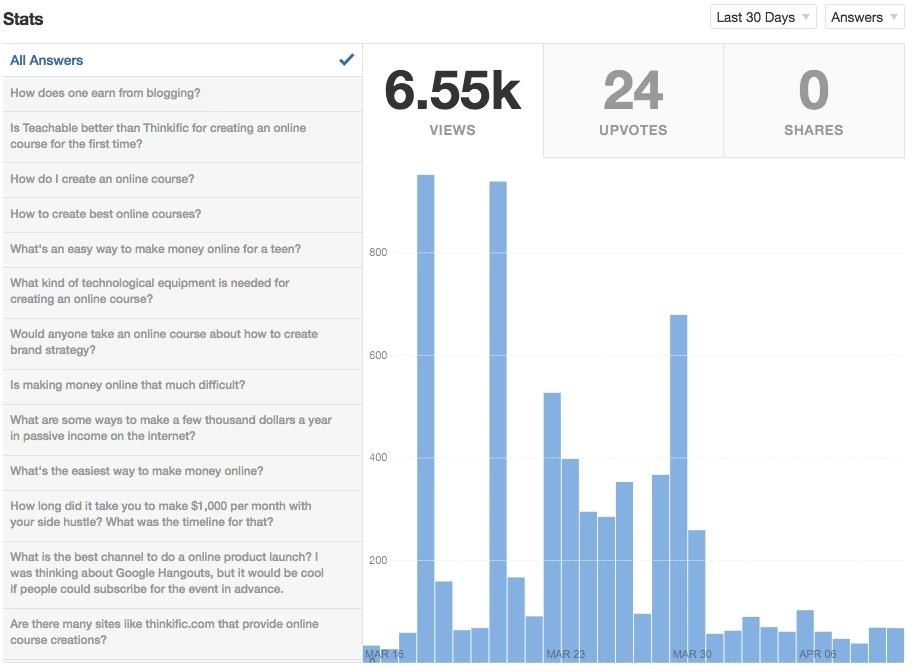
You’re able to use Quora’s free analytics tool to track your various blog posts, questions, answers and such. You can then view by clicks, vies, shares, and upvotes. As we’ve talked about before, analytics are helpful for understanding what content resonates with your audience, what does not, and what you can do more of.

Because Quora does incredibly well on Google, but it tends to take a bit of time to rank the newer questions. So at the time of answering a question, your answer might be on page 15 of Google, but a month later on the second.
Now, that’s not to say that this will happen with all Quora answers—a lot of them never make it anywhere near the front page of Google and you’ll see very little traffic to those answers. But you can use the Quora analytics to figure out what type of answers are doing the best.
What about unexplained spikes?
Every now and then you’ll see a spike in Quora that lasts a day or two and then drops again. Those spikes can come from Quora combining like questions. So if there are a dozen questions in the last month asking, “How can I make money online” Quora will sometimes smash it into a mega-thread and everyone who answered will get a notification and you’ll see a spike in views. This means you should get strategic!
When you’re searching for questions to answer, look for ones that have a lot of duplicates. Don’t answer willy-nilly, but now rather use this strategy for combined questions a few times a week. You just might see a lot more spikes in traffic and thus a lot more click through.
Portions of this post were written and reported by Morgan Timm.
1. What is Quora?
Quora is a site that allows its users to ask and answer questions. These questions can range from hypotheticals, specific business or industry specific, or story or expert requests. It’s a lot like Reddit in the sense that you’ve got an upvoting system and the higher ranked your answer, the more people will see it. Quora is an excellent resource for creators, teachers, business owners, experts, and thought leaders to share their knowledge to an attentive audience.
2. Is Quora good for marketing?
Quora is good for marketing yourself or your brand for several reasons. Because it’s free to use, there’s a low barrier to entry on Quora. This is a great marketing opportunity to establish yourself as a thought leader and expert in a particular niche topic. Because Quora has a large user group with varied interests, this allows you to market yourself or your business to specific people. However, it’s important to make sure that you’re providing high value content that’s relevant to the question and the audience that you’re serving. In order to maximize your marketing potential on Quora, it’s important to be authentic and organic with your answers and interactions.
Join more than 150,000 creators who use Teachable to make a real impact and earn a real income.



%201%20(1)%20(1).png)

.png)
.png)
